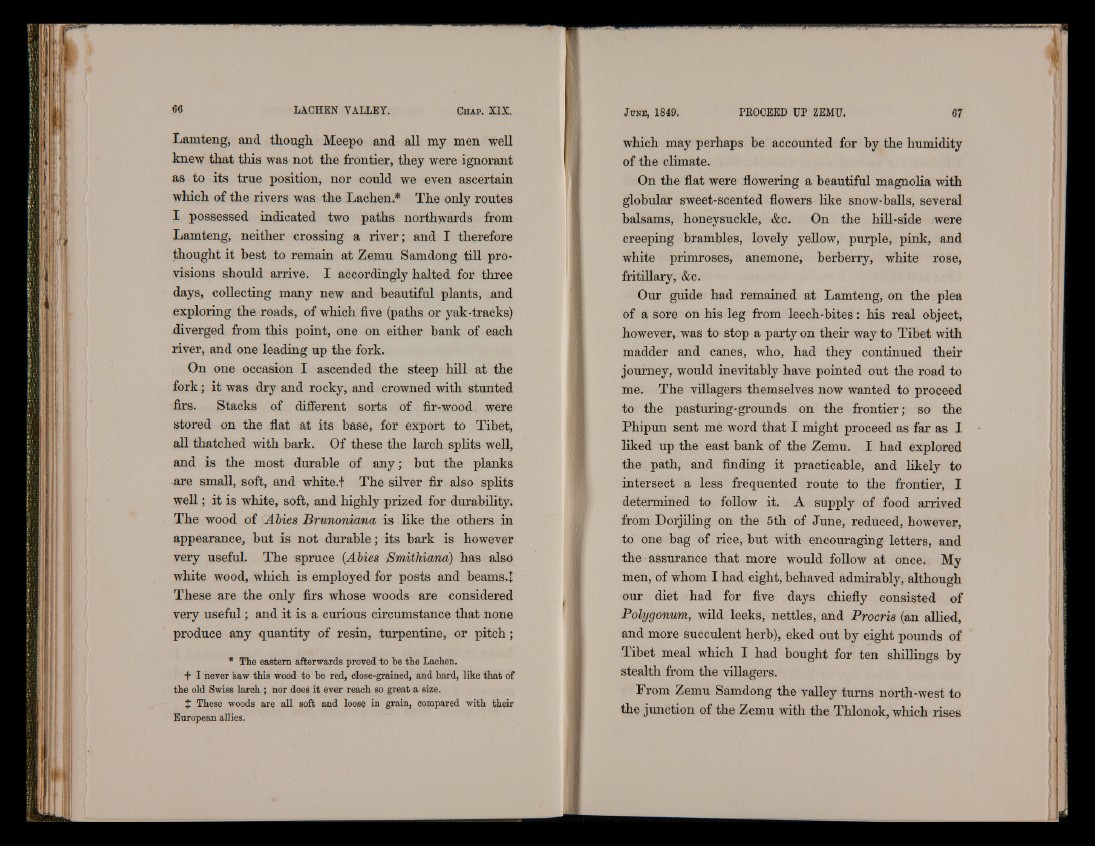
Lamteng, and though Meepo and all my men well
knew that this was not the frontier, they were ignorant
as to its true position, nor could we even ascertain
which of the rivers was the Lachen.* The only routes
I possessed indicated two paths northwards from
Lamteng, neither crossing a river; and I therefore
thought it best to remain at Zemu Samdong till provisions
should arrive. I accordingly halted for three
days, collecting many new and beautiful plants, and
exploring the roads, of which five (paths or yak-tracks)
diverged from this point, one on either bank of each
river, and one leading up the fork.
On one occasion I ascended the steep hill at the
fork; it was dry and rocky, and crowned with stunted
firs. Stacks of different sorts of fir-wood were
stored on the flat at its base, for export to Tibet,
all thatched with bark. Of these the larch splits well,
and is the most durable of an y ; but the planks
are small, soft, and white.f The silver fir also splits
well; it is white, soft, and highly prized for durability.
The wood of Abies Brunonicma is like the others in
appearance, but is not durable; its bark is however
very useful. The spruce (Abies Smithiana) has also
white wood, which is employed for posts and beams.*
These are the only firs whose woods are considered
very useful; and it is a curious circumstance that none
produce any quantity of resin, turpentine, or p itc h ;
* The eastern afterwards proved to be the Lachen.
+ I never 'saw this wood to be red, close-grained, and hard, like that of
the old Swiss larch ; nor does it ever reach so great a size.
J These woods are all soft and loose in grain, compared with their
European allies.
which may perhaps be accounted for by the humidity
of the climate.
On the flat were flowering a beautiful magnolia with
globular sweet-scented flowers like snow-balls, several
balsams, honeysuckle, &c. On the hill-side were
creeping brambles, lovely yellow, purple, pink, and
white primroses, anemone, berberry, white rose,
fritillary, &c.
Our guide had remained at Lamteng, on the plea
of a sore on his leg from leech-bites: his real object,
however, was to stop a party on their way to Tibet with
madder and canes, who, had they continued their
journey, would inevitably have pointed out the road to
me. The villagers themselves now wanted to proceed
to the pasturing-grounds on the frontier; so the
Phipun sent me word that I might proceed as far as I
liked up the east bank of the Zemu. I had explored
the path, and finding it practicable, and likely to
intersect a less frequented route to the frontier, I
determined to follow it. A supply of food arrived
from Dorjiling on the 5th of June, reduced, however,
to one bag of rice, but with encouraging letters, and
the assurance that more would follow at once. My
men, of whom I had eight, behaved admirably, although
our diet had for five days chiefly consisted of
Polygonum, wild leeks, nettles, and Procris (an allied,
and more succulent herb), eked out by eight pounds of
Tibet meal which I had bought for ten shillings by
stealth from the villagers.
From Zemu Samdong the valley turns north-west to
the junction of the Zemu with the Thlonok, which rises